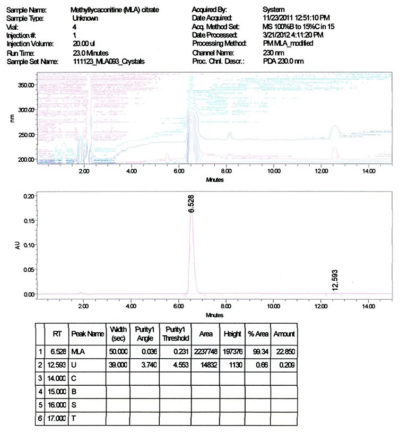A bioactive constituent of Delphinium ajacis, which acts as a nicotinic receptor antagonist
- Catalog No: APH-06011
- CAS Number: 21019-30-7
- Chemical Formula: C37H50N2O10•C6H8O7
- Molecular Weight: 874.93 (anhydrous base)
- Purity: > 99% determined by HPLC
- Appearance: White crystalline solid
- Solubility: Soluble in water and DMSO
- Stability: See storage and handling conditions.
- Storage: Store at -20ºC
- Shipping: On ice (4ºC)
- Handling: Avoid exposure to oxygen and direct sunlight.
Source:
Methyllycaconitine (MLA) is a norditerpenoid alkaloid isolated from various Delphinium spp., and is thought to be responsible for the toxicity observed in these plants.
At Aphios®, MLA is extracted from Delphinium ajacis (rocket larkspur) seeds using long-column chromatography and then it is stabilized by crystallization as the citrate salt.
Biological Activity:
Methyllycaconitine is a selective and potent antagonist of the α7 neuronal nicotinic acetylcholine receptors (nAChR) (Ki = 1.4 nM) (Ward et al., 1990). nAChR are ligand-gated ion channels that mediate fast synaptic transmission.
A study by Dobelis et al. (1999) showed that MLA acts as a nicotinic receptor antagonist that reduces synaptic efficacy and blocks neuromuscular transmission. The toxicity of the alkaloid is thought to be due to the substituent at C14 and the ester function in C18, which determines the potency and possibly the mechanism of nicotinic acetylcholine receptor blockade for MLA (Dobelis et al., 1999).
References:
Dobelis P, Madl J, Pfister J, Manners G and Walrond J. (1999). Effects of Delphinium alkaloids on neuromuscular transmission. JPET 291: 538-546.
Ward J, Cockcroft V, Lunt G, Smillie F and Wonnacott S. (1990). Methyllycaconitine: a selective probe for neuronal alpha-bungarotoxin binding sites. FEBS letters 270: 45-48.

